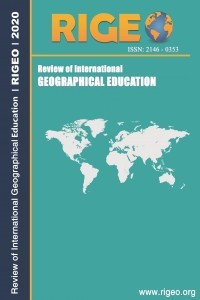The Challenge to Change (?) Geography Teaching From a Number of Perspectives Offered By Polish Student-Teachers at the University of Gdańsk
The Challenge to Change (?) Geography Teaching From a Number of Perspectives Offered By Polish Student-Teachers at the University of Gdańsk
The
author interprets comments made by student-teachers given during interviews, as
well as notes written in their teaching practice journals, made during or
completed shortly after their practices in school. The background to these
interpretations are official documents (e.g. the Polish Standards for Teacher
Education, the Polish National Curriculum) and theories of learning and
teaching (constructivist vs behaviorist). The main questions asked are what
knowledge is important for young teachers and how they want to teach it. Other
questions include: What possibilities does school give them to try out their
ideas about teaching? What does school actually give them? What does school
demand of them? What do their practices at school actually teach them (the tacit
programmme)? And, how do the students actually view the reality that exists in
school? Overall, the student's impressions show school to be a very formal
organisation, where the teacher-trainer decides on the content of lessons,
methods of learning and the course of
lessons ("for the good of pupils"). In many cases too, the students
only realise their teacher's ideas. In such a situation, this raises the
question of whether or not they will be able to provide innovative education if
they cannot themselves attempt to implement their own ideas.
Keywords:
Geography teacher education concepts of teaching and learning, student's personal knowledge about teaching,
___
- Atkinson P., Coffey A. (2011). Analysing Documentary Realities. In D.Silverman (Ed.) Qualitative Research (3rd ed.). London: SAGE Publication.
- Bauman, Z. (2012). On Education. Conversations with Riccardo Mazzeo. Cambridge: Polity Press Ltd.
- Bernstein, B. B. (1975). On the Classification and Framing of Educational Knowledge. Class, Codes, and control (vol. 3). London: Routledge and K. Paul.
- Biddulph M., Lambert D. and Balderstone D. (2015). Learning to Teach Geography in the Secondary School: A companion to school experience. Abingdon: Routledge. Bordieu, P. and Passeron, J.-C. (1990). Reproduction in Education, Society and Culture. London: Sage. Bruner, J. (1996). The Culture of Education. Harvard University Press.
- Bullough, R. and Gilis, A. (1991). Educative communites and the development of the reflective practitioner. In B. Tabachnik and K. Zeichner (Eds). Issues and practices in inquiry-oriented teacher education. New York: The Falmer Press.
- Butt G. (2011). Introduction. In Butt G. (ed.) Geography, Education and the Future. London and New York: Continuum International Publishing Group.
- Chałubińska, A. (1954). Różne drogi nauczania geografii. Warszawa: PZWS.
- Combs, A. W., Blume R. A., Newman A. J. and Wass, H. J. (1978). The Professional Education of Teachers. A Humanistic Approach to Teacher Preparation. Boston: Allyn & Bacon Inc.
- Charmaz K. and Bryant A. (2011). Grounded Theory and Credibility. In D. Silverman (Ed.) Qualitative Research (3rd ed.). London: SAGE Publication.
- Giroux, H. (1988). Teacher as Intellectuals: Towards a Critical Pedagogy of Learning. Westport, CT: Bergin & Garvey.
- Kincheloe, J. (1993). Towards a Critical Politics of Teacher Thinking: Mapping the Postmodern. Westport, CT: Bergin & Garvey.
- Klus-Stańska, D. (2010). Dydaktyka wobec chaosu pojęć i zdarzeń. Warszawa: Wydawnictwo Akademickie ŻAK,.
- Kwiatkowska, H. (2008). Pedeutologia. Warszawa: Wydawnictwa Akademickie I Profesjonalne.
- Lambert D. and Jones M. (eds.) (2014). Debates in Geography Education. London – New York: Routledge.
- Majcher, I. and Sadoń-Osowiecka, T. (2007). ”Głową muru nie przebijesz” – refleksje nad studenckimi trudnościami z rekonstruowaniem wiedzy osobistej o nauczaniu. In M. Gwoździcka-Piotrowska, J. Wołejszo and A. Zduniak (Eds.), Edukacja w społeczeństwie ryzyka. Bezpieczeństwo jako wartość. T. 3. Poznań: Wydawnictwo Wyższej Szkoły Bezpieczeństwa w Poznaniu.
- Mietzel, G. (2002), Psychologia kształcenia. Praktyczny podręcznik dla pedagogów i nauczycieli. Gdańsk: Gdańskie Wydawnictwo Pedagogiczne.
- Ministry of Science and Higher Education directive (2012, January 17). Rozporządzenie Ministra Nauki I Szkolnictwa Wyższego z dnia 17 stycznia 2012 r. w sprawie standardów kształcenia przygotowującego do wykonywania zawodu nauczyciela Retrived from: http://isap.sejm.gov.pl/DetailsServlet?id=WDU20120000131)
- Mizerek, H. (1999). Dyskursy współczesnej edukacji nauczycielskiej. Między tradycjonalizmem a ponowoczesnością. Olsztyn: UniwersytetWarmińsko-Mazurski.
- Morgan J. and Lambert D. (2005). Geography: Teaching School Subjects 11-19. London: Routledge.
- Nałkowski, W. (1887). Zarys geografji powszechnej (rozumowej). Warszawa: Paprocki.
- Schön, D. (1983). The Reflective Practitioner. New York: Basic Books.
- Tripp, D. (1993). Critical Incidents in Teaching: Developing professional judgement. London: Routledge.
- Winklewski, J. (1969). Rysunek w nauczaniu geografii. Warszawa: PZWS.
- Wortham, S.and Jackson, K. (2008). Educational Contructionisms. In J. M., Holstein and J. F., Gubrium (Eds.), Handbook of Constructionist Research. New York: Guilford Press.
- Wuttke, G. (1957). Ćwiczenia i wycieczki terenowe w nauczaniu geografii. Warszawa: PZWS.
- Young, M. (2014). Knowledge, curriculum and the future school. In M. Young, D. Lambert, C. Roberts and M. Roberts (Eds.), Knowledge and the Future School: Curriculum and the Social Justice. London: Bloomsbury Academic.
- Young M., Lambert D., Roberts C. and Roberts M. (Eds.) (2014). Knowledge and the Future School: Curriculum and the Social Justice. London: Bloomsbury Academic.
- Zinovjev, A. (1984). Homo sovieticus. London: Wyd. EPUB. Polonia.
- ISSN: 2146-0353
- Başlangıç: 2011
- Yayıncı: Eyüp ARTVİNLİ
Sayıdaki Diğer Makaleler
Daihu YANG, Ziying WANG, Di XU
Fernando ALEXANDRE, Manuela Malheiro FERREIRA
Karen THOMAS-BROWN, Allison RICHARDS
Sarah Witham BEDNARZ, Minori YUDA
